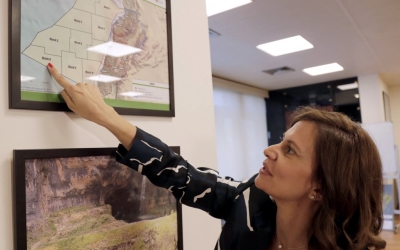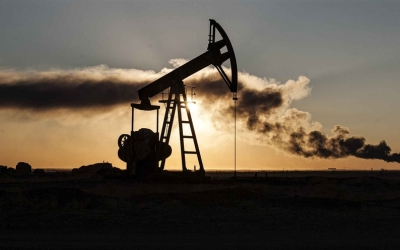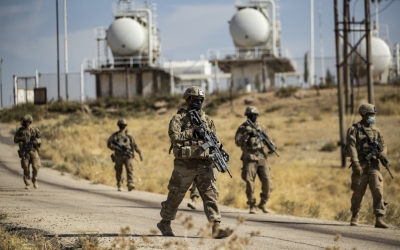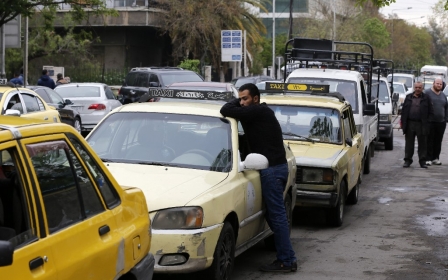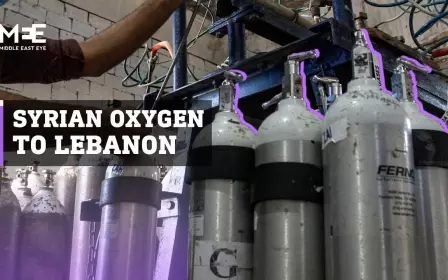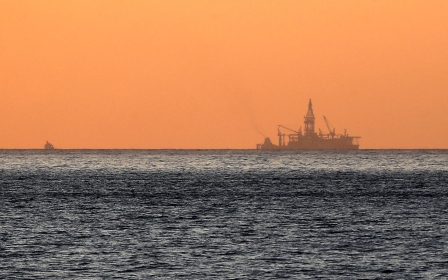Syria's oil and gas exploration deal with Russia threatens maritime dispute with Lebanon
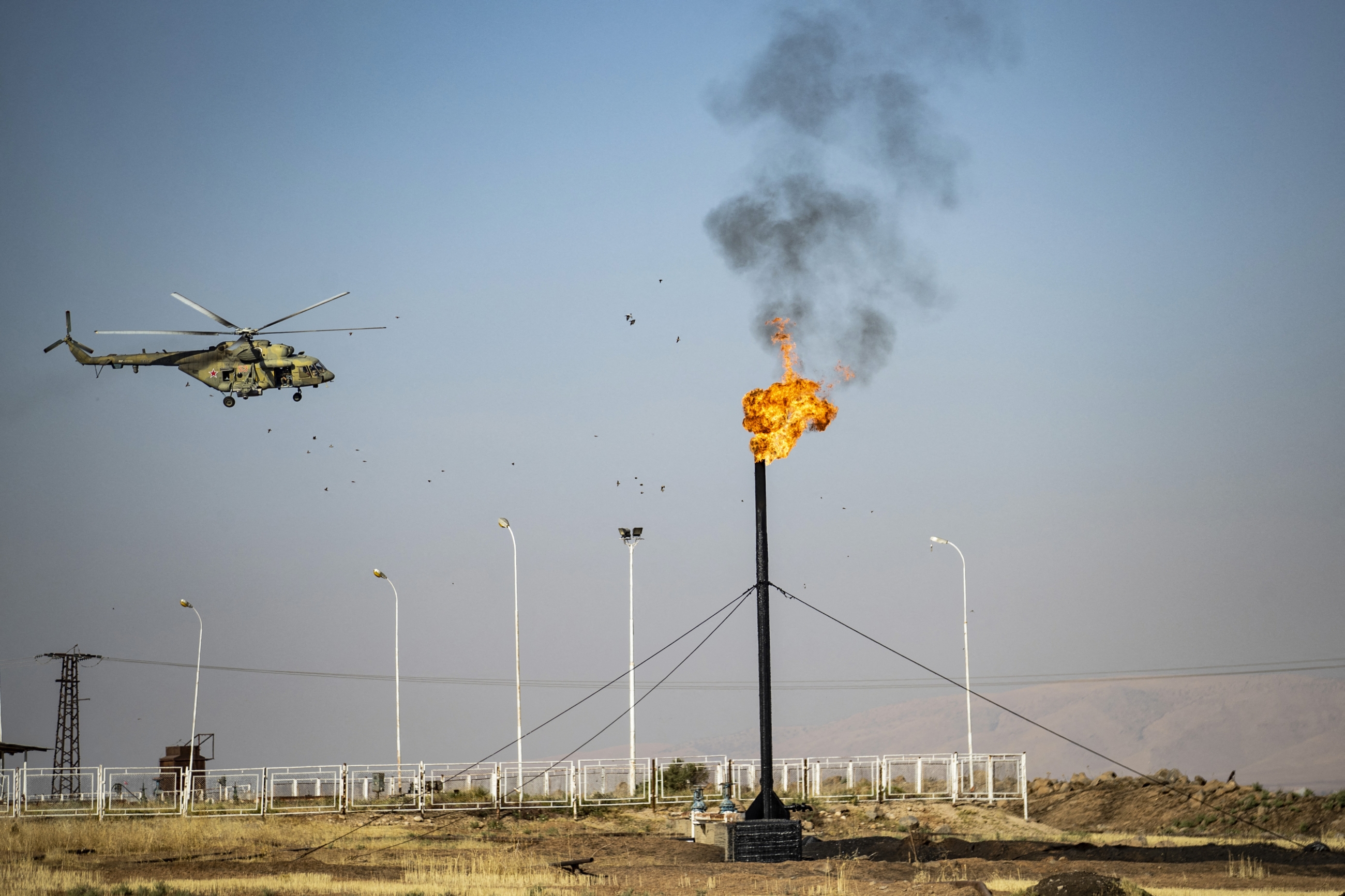
The signing by Syria of a four-year contract with a Russian company for oil and gas exploration in the eastern Mediterranean has sparked concerns in Lebanon that the deal violates its maritime borders.
Syrian President Bashar al-Assad ratified the contract with Petrozavodsk-based Capital Oil last month, under a contract initially drawn up in April 2020.
However, 750 square kilometres of the area assigned for exploration overlaps Lebanese economic waters.
The issue comes amid existing Lebanese maritime concerns over losing parts of its economic waters, as Beirut continues indirect talks with Israel over their disputed maritime border.
Lebanon and Israel each claim about 860 square kilometres of the Mediterranean Sea as being within their own exclusive economic zones.
Assad's move prompted Lebanese President Michael Aoun to phone his Syrian counterpart to discuss the issue, explaining that “Lebanon will not accept to diminish its sovereignty over its waters”, according to Lebanese caretaker foreign minister Charbel Wehbe who spoke to television station MTV.
Wehbe also confirmed Lebanon would stick to demarcating the maritime borders via negotiations, and not court disputes.
Illegal basis
Lebanon demarcated its exclusive economic zone in 2011 through Decree No. 6433, which was sent to the United Nations.
Syria objected to the unilateral Lebanese demarcation in the north, sending a protest letter to the UN in 2014.
Since then, the two countries have failed to resolve the dispute, despite Russia proposing itself as a mediator between the two countries in 2019.
However, Diana Kaissy, executive director of the Lebanese Oil and Gas Initiative (LOGI), tells Middle East Eye that Damascus' complaint was made on an illegal basis, as Syria is not a signatory country of the United Nations Convention on the Law of the Sea (UNCLOS).
“There are some other issues between Lebanon and Syria regarding demarcation of lands, for instance, the ones regarding the Shebaa Farms," says Kaissy.
"However, our recommendation to Lebanon is to keep its delimited official marks.”
Although the emerging maritime dispute between Lebanon and Syria has been politicised in Lebanon, experts agree it can be solved on a technical basis.
For Marc Ayoub, an assistant researcher on energy policy and security at the American University of Beirut, the dispute is purely a technical issue.
“The contract between the Syrian government and Capital clearly states there is a dispute between Syria and Lebanon, and they are ready to negotiate and discuss it,” says Ayoub.
The Lebanese army would reportedly join any negotiation team of experts that would sit down with their Syrian counterparts to reach a technical solution.
But it is too early to say what such negotiations would bring.
Need for reform
Both Lebanon and Syria have a huge interest in the oil and gas resources to be found in the East Mediterranean Sea, although neither are sure about the real extent of the oil and gas resources in the Levantine Basin.
Lebanese energy policies have been stuck for years, and the current economic and financial crisis means that is unlikely to change.
'Oil and gas will not save Lebanon. It is not the magic wand that will save us'
- Diana Kaissy, executive director of LOGI
However, for a country in desperate need of energy, counting only on oil and gas solutions might not help in the short term.
Roudi Baroudi, an energy industry expert and chief executive of Energy and Environment Holding, tells MEE that since 1998 Lebanon has not added a single megawatt to its energy sector due to political disputes.
“The political institutions need to decide what to do with reforms," says Baroudi.
"The energy sector can’t flourish without reforms, and without the rule of law there is no future."
Echoing Baroudi's views, Kaissy states: “Oil and gas will not save Lebanon. It is not the magic wand that will save us.
"It can help when Lebanon puts in place proper economic, political and social reforms. Once these reforms will be put in place, any potential finds can contribute to the Lebanese energy sector.”
Syria's lost resources
Syria too, is not without its energy problems, having set aside its energy policy at the outset of the country's civil war.
Syrian economic expert and researcher Younes Alkarim pointed out to MEE that the Syrian government lost control of most of its oil wells in 2013.
'The amount [of oil] produced by the SDF may be around 90,000-110,000 bpd, while the production from Syria government-held areas is roughly 25,000 barrels'
- Karam Shaar, Syrian economic expert
Furthermore, political instability, and US and European sanctions have hit Syria's oil sector.
Nowadays, the vast majority of the country's oil resources are under the control of the Syrian Democratic Forces (SDF) in northern Syria.
Karam Shaar, a Syrian economic expert, tells MEE. “The amount [of oil] produced by the SDF may be around 90,000-110,000 barrels per day, while the production from Syria government-held areas is roughly 25,000 barrels.
"Syria is split into multiple natural resource blocks, which haven’t changed after the war.
"Blocks have been offered to different companies, some of them Russian, including Velada LLC and Mercury LLC, which are planning to invest.”
Shaar says he thinks that the maritime dispute has become urgent because of the ratification of Syria's contract with Capital.
However, Shaar also believes that Capital will not be investing in the maritime block.
“They are just putting their hands on it for the future. So, they may rent it out or sell it to another company,” he says.
Russia's strategy
Russian interests in the Eastern Mediterranean’s oil and gas resources can be explained at a geopolitical level.
Alkarim says Russia aims to control the Eastern Mediterranean waterfront by minimising any competition from rival gas pipelines, like the proposed Friendship Pipeline between Iran, Iraq and Syria, or any other projects in the region.
'Russia aims only to prevent its competitors to take part in drawing the oil map of the East Mediterranean Sea'
- Younes Alkarim, Syrian economic expert
This strategy would give Russia access to any sharing of the Mediterranean’s wealth and a greater ability to manoeuvre for its own oil and gas plans.
“Russia aims only to prevent its competitors to take part in drawing the oil map of the East Mediterranean Sea, protecting its oil and gas resources and blocking anything that threatens it,” says Alkarim.
Neil Quilliam, a specialist in energy policy and associate fellow at Chatham House, says Syria's primary energy policies are to ensure the security and reliability of its energy supply, which is necessary for economic recovery.
“Russia can help facilitate delivery of Iranian products to the Syrian market by exercising political leverage and its naval presence in the Mediterranean," says Quilliam.
"It also wants to snap up opportunities in Syria's upstream to further embed itself into the Syrian economy and create dependency.”
Lebanese deals
Russia's interest in natural resources in the Eastern Mediterranean is not only expressed through its partnership with Syria.
It has also gained access to the sea via Lebanon in two forms.
First, the Russian company Novatek is part of a consortium with Total and ENI that has started oil and gas exploration on behalf of Lebanon in the Levantine Basin.
Second, in 2019 Lebanon signed an agreement with Russia's Rosneft oil company for it to provide operational management of the oil products storage terminal at the port of Tripoli for a term of 20 years.
Quilliam thinks that Russia wishes to exercise influence over development of the Levantine Basin to reduce US energy diplomacy, and ensure that the development of the Basin does not pose a threat to Russian pipeline gas exports to Europe.
“It is highly unlikely that Eastern Mediterranean gas could ever challenge Russia's market penetration in Europe, which means that its first goal to challenge US influence in the region is its primary objective,” he says.
'New opportunities'
Baroudi said that gas resources in the Eastern Mediterranean have become an attractive opportunity for those countries in the area.
“The entire world is looking for a cleaner fuel than oil. Gas is the best fossil fuel to protect the environment.
"The Eastern Mediterranean countries, except Egypt, import oil and gas from other countries.
"Today, Israel and Cyprus have found a feasible amount of gas. If these countries can extract gas, their balance sheet will increase.
"This can open new opportunities to run social security programmes and reduce poverty to fight back terrorism,” he says.
It is too early to say if the emerging dispute between Lebanon and Syria may affect their relations, but experts such as Baroudi believe it will not affect the indirect talks between Lebanon and Israel over their maritime dispute because they are two different disputes that need to be treated separately.
'Two brotherly countries'
“The dispute between Lebanon and Syria is the least problematic dispute in the East Mediterranean, taking into consideration the problematic issues between Turkey, Greece, and Cyprus," says Baroudi.
"Syria and Lebanon are two brotherly countries. They have over 40 years of cooperation.”
One of the technical solutions to settle the dispute may be to follow the land terminus point between the two countries, taking the Nahr al-Kabir river’s outlet as the demarcation point on which to calculate the maritime boundaries, explains Baroudi.
Although some studies show that the maritime zone for the exploration may contain oil and gas, to understand its economic value, countries will have to wait for drilling operations.
Only then will Lebanon, Syria and other entities interested in the Levantine Basin’s natural resources be able to evaluate the economic feasibility of backing oil and gas to increase their energy portfolios.
Middle East Eye propose une couverture et une analyse indépendantes et incomparables du Moyen-Orient, de l’Afrique du Nord et d’autres régions du monde. Pour en savoir plus sur la reprise de ce contenu et les frais qui s’appliquent, veuillez remplir ce formulaire [en anglais]. Pour en savoir plus sur MEE, cliquez ici [en anglais].


